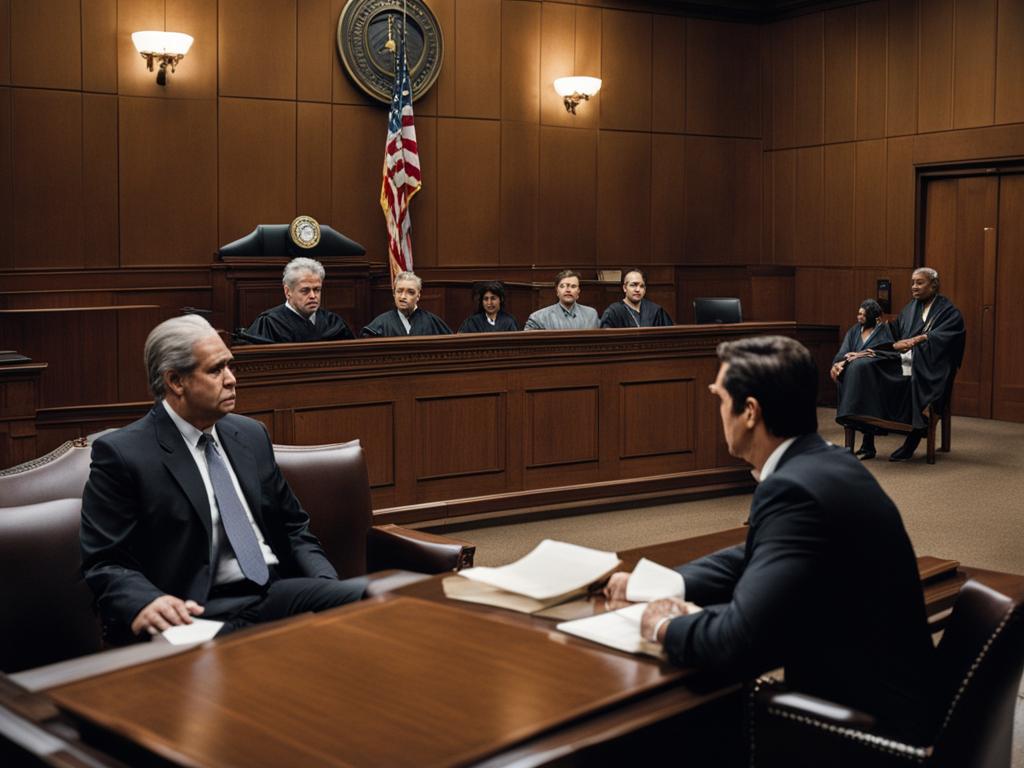Can You Sue Someone After Settling With Their Insurance?
Once a personal injury claim is settled, you typically do not have the right to file a lawsuit against the responsible party. However, there are exceptions to this rule that allow you to sue after settling, such as cases of fraud or coercion, the discovery of another responsible party, and when the settlement does not fully compensate for extensive damages. It is important to consult with a personal injury lawyer and carefully consider your options before accepting any settlement offer.
- Settling a personal injury claim usually prevents you from filing a lawsuit against the responsible party.
- Exceptions to this rule include cases of fraud or coercion, the discovery of another responsible party, and insufficient compensation for extensive damages.
- Consulting with a personal injury lawyer is crucial before accepting any settlement offer.
- Consider the long-term implications of accepting a settlement and ensure it adequately covers your damages.
- Understanding your legal rights and options is essential to navigating the settlement process effectively.
When You Cannot Sue After Settling
When you settle an accident claim, you will typically be required to sign a written agreement that releases the at-fault party from any further liability. This agreement is made in exchange for the settlement money provided by the insurance company. By signing the agreement, you accept the settlement money as full satisfaction of all claims and promise not to pursue further compensation. This release is a legally binding contract, and even if you later discover that your claim was worth more or your injury was worse than expected, the release still applies.
The written agreement acts as a liability release, safeguarding the at-fault party from any additional legal action. It signifies that you have accepted the settlement money and have chosen not to pursue further compensation for your injuries. Consequently, once the agreement is signed, you forfeit your right to sue the at-fault party for any future damages related to the incident. It is crucial to understand the implications of this legally binding contract before accepting any settlement offer.
“By signing the agreement, you accept the settlement money as full satisfaction of all claims and promise not to pursue further compensation.”
It is important to carefully review and consider the written agreement before signing it. Consulting with a personal injury lawyer can help you understand the legal repercussions and ensure that you are making an informed decision. A lawyer can assess the fairness of the settlement offer, review the terms of the agreement, and advise you on whether accepting the settlement is in your best interest.
| When You Cannot Sue After Settling | |
|---|---|
|
When Can You File Suit After Settling?
While the general rule is that you cannot file a lawsuit after settling your injury claim, there are exceptions. You may be able to sue after settling if there is evidence of fraudulent or coercive behavior by the defendant during the settlement negotiation. Additionally, if there is another party involved in the accident who was not initially identified or included in the settlement, you may be able to sue that second defendant. However, it is important to act within the applicable statute of limitations, which sets a time limit for filing a lawsuit after an accident.
Exceptions to the Rule:
- Fraudulent or Coercive Behavior: If the defendant engaged in fraudulent or coercive behavior during the settlement negotiation process, such as withholding critical information or pressuring you into accepting an unfair settlement, you may have grounds to file a lawsuit even after settling.
- Second Defendant Involvement: If you discover that another party was also responsible for your injuries but was not originally identified or included in the settlement, you may have the right to sue that second defendant separately.
Statute of Limitations:
The statute of limitations establishes the time period within which a lawsuit must be filed. It varies by state and type of claim, typically ranging from 1 to 6 years. If you wish to file a lawsuit after settling, it is crucial to adhere to the applicable statute of limitations to preserve your right to legal action.
It is important to consult with a personal injury attorney to understand the specific laws and regulations in your jurisdiction and to determine if you have a valid case for filing a lawsuit after settling.

Table: Examples of Statute of Limitations for Personal Injury Lawsuits by State
| State | Statute of Limitations |
|---|---|
| California | 2 years |
| Texas | 2 years |
| New York | 3 years |
| Florida | 4 years |
What Should I Do Before Settling?
Before accepting any settlement offer, it is crucial to take certain steps to protect your rights and ensure that you are making an informed decision. Here are some important things you should do before settling:
- Seek medical attention: It is essential to seek medical attention for your injuries, even if they seem minor at first. A thorough medical evaluation will help you understand the extent of your injuries, the potential long-term effects, and the necessary medical treatments. This information is crucial in determining the fair compensation you should receive.
- Consider the impact on your job: Evaluate how your injuries may impact your ability to work. Will you need to take time off? Will you have ongoing medical treatments that could affect your job performance? Consider the potential loss of income and career opportunities when determining the adequacy of the settlement offer.
- Gather documentation: Collect all relevant documentation to support your claim. This may include medical records, bills, photos of injuries, witness statements, and any other evidence that demonstrates the impact of the accident on your life. Strong documentation strengthens your position and helps ensure you receive fair compensation.
- Hire an attorney: Consulting with a personal injury attorney is highly recommended before accepting any settlement offer. An experienced attorney can review the offer, assess its fairness, and provide guidance on your legal rights. They can negotiate on your behalf to ensure the settlement covers all your damages and protects your interests.
Taking these steps before settling can help you make an informed decision and maximize the compensation you receive for your injuries. Consult with a personal injury lawyer to ensure that your rights are protected and that you are receiving fair and just compensation.
Do’s and Don’ts of Accepting an Insurance Settlement Offer
When considering an insurance settlement offer, it’s important to approach the decision carefully and consider several factors. By following these do’s and don’ts, you can make an informed choice that protects your rights and best interests:
Do Seek Medical Attention
After an accident, even if your injuries seem minor at first, it’s crucial to seek medical attention. Some injuries may not be immediately apparent and could worsen over time. Getting a thorough medical evaluation will help you understand the extent of your injuries and ensure that you receive appropriate treatment.
Do Consider the Impact on Your Work
When evaluating an insurance settlement offer, consider how your injuries may impact your ability to work. Will you need to take time off? Will you have ongoing medical expenses that affect your finances? Take into account the potential long-term impact on your employment and financial stability.
Do Document Treatment and Recovery
Keep detailed records of all medical treatment and recovery processes, including doctor visits, medications, therapies, and any related expenses. These records will help support your claim and provide evidence of the extent of your injuries.
Do Consult with an Attorney
It is highly recommended to consult with a personal injury attorney before accepting or rejecting an insurance settlement offer. An experienced attorney can evaluate the fairness of the offer, negotiate on your behalf, and ensure that your rights and interests are protected throughout the settlement process.
Don’t Rush the Decision
Take your time before accepting or rejecting a settlement offer. Insurance companies may pressure you to settle quickly, but it’s important to carefully review the terms and consider the impact on your future. Seek legal advice and fully understand the implications of accepting the offer before making a decision.
Don’t Accept an Unfair Offer
If the insurance settlement offer does not fully compensate you for your injuries and damages, it may be in your best interest to reject the offer. Work with an attorney to evaluate the offer and determine if it adequately covers your losses.

| Do’s | Don’ts |
|---|---|
| Seek medical attention | Rush the decision |
| Consider the impact on work | Accept an unfair offer |
| Document treatment and recovery | |
| Consult with an attorney |
When a Settlement Can Be Overturned
In certain circumstances, a settlement can be overturned and allow for further legal action. There are a few key situations where this may occur:
- If there is evidence of fraud or coercion in the settlement process, the courts may allow the other party to sue for additional damages.
- Another situation where a settlement can be overturned is when the injured party discovers the involvement of another at-fault party who was not initially part of the settlement.
- Additionally, if the at-fault party’s insurance coverage lapsed, the injured party may be able to pursue compensation directly from the at-fault party.
| Reasons for Overturning a Settlement | Explanation |
|---|---|
| Fraud or Coercion | If there is evidence that the settlement was obtained through fraudulent or coercive behavior, the courts may allow the injured party to seek further compensation. |
| Additional At-Fault Party | If the injured party discovers the involvement of another at-fault party who was not included in the initial settlement, they may be able to pursue legal action against that party. |
| Lapsed Coverage | If the at-fault party’s insurance coverage lapsed at the time of the accident, the injured party may be able to seek compensation directly from the at-fault party. |
It is important to note that these exceptions to a settled claim are not common and require strong evidence and legal intervention. If you believe that your settlement should be overturned based on one of these reasons, it is crucial to consult with a personal injury lawyer who can guide you through the process and evaluate the viability of your case.

The Statute of Limitations on Car Accident Lawsuits
Car accidents can result in significant physical, emotional, and financial trauma for those involved. If you’re considering filing a lawsuit after a car accident, it’s crucial to understand the statute of limitations that applies to your case. The statute of limitations is the time limit within which a lawsuit must be filed, and it varies by state. By familiarizing yourself with the statute of limitations and its exceptions, you can protect your legal rights and ensure timely action.
Time limit to file a lawsuit: Each state has a specific time frame during which a car accident lawsuit must be initiated. This timeframe typically ranges from two to six years, depending on the jurisdiction. It’s important to note that the statute of limitations begins to run from the date of the accident or the discovery of the injury, depending on state laws. Failing to file a lawsuit within the prescribed time limit can result in the dismissal of your case, barring you from seeking compensation for your damages.
Exceptions to the statute of limitations: While the statute of limitations sets a general timeframe for filing a lawsuit, there are exceptions that may extend or pause the clock. For example, if the defendant leaves the state after the accident, the statute of limitations may be tolled or extended until they return. Similarly, if the injured party was a minor at the time of the accident, the statute of limitations may not begin until they reach the age of majority. Additionally, if the defendant becomes mentally incapacitated, the statute of limitations may be paused until they regain competency.
| State | Statute of Limitations |
|---|---|
| California | 2 years |
| Texas | 2 years |
| New York | 3 years |
It’s crucial to consult with a personal injury attorney to understand the specific statute of limitations that applies to your case. An attorney can guide you through the legal process, ensure timely filing, and help protect your rights. Remember, strictly adhering to the statute of limitations is essential for pursuing a car accident lawsuit and seeking the compensation you deserve.

The Importance of Working With a Skilled Personal Injury Lawyer
When it comes to settling a personal injury claim, the importance of working with a skilled personal injury lawyer cannot be overstated. A knowledgeable attorney can guide you through the complex legal process, negotiate a fair settlement on your behalf, and protect your rights every step of the way.
One of the primary roles of a personal injury lawyer is to negotiate a settlement that adequately compensates you for your injuries and losses. They have the experience and expertise to assess the value of your claim, taking into account various factors such as medical expenses, lost wages, pain and suffering, and future damages. By working with a lawyer, you can ensure that you receive the compensation you deserve and prevent future legal action.
“Having a personal injury lawyer by your side can make all the difference in the outcome of your case. They have the skills and resources to gather evidence, interview witnesses, and build a strong legal strategy. Their expertise in personal injury law allows them to navigate the complexities of the legal system and fight for your rights.” – Personal Injury Attorney John Smith
Moreover, a personal injury lawyer can protect your rights throughout the entire settlement process. Insurance companies often try to minimize their payout or deny claims altogether. With a skilled attorney advocating for you, you can level the playing field and ensure that your rights are protected. They will handle all communication with the insurance company, saving you the stress and frustration of dealing with them directly.
Overall, working with a skilled personal injury lawyer is crucial for negotiating a fair settlement, preventing future legal action, and protecting your rights. Their expertise and guidance can make a significant difference in the outcome of your case, allowing you to focus on your recovery while they handle the legal complexities. If you have been injured in an accident, it is highly recommended to consult with a personal injury lawyer to ensure the best possible outcome for your case.
Conclusion
While it is generally not possible to sue someone after settling with their insurance, there are exceptions to this rule. It is important to consult with a personal injury lawyer to understand your legal rights and options. By carefully considering the circumstances, seeking appropriate medical attention, gathering documentation, and working with an attorney, you can navigate the settlement process effectively and protect your interests.
Post-settlement lawsuits can arise in cases involving fraud or coercion, the discovery of another responsible party, or when the settlement does not fully compensate for extensive damages. These exceptions allow you to pursue legal action even after settling your claim. However, it is crucial to consult with a personal injury lawyer and act within the applicable statute of limitations to ensure that your rights are protected and you receive the compensation you deserve.
Consulting with a personal injury lawyer is essential to understand the specific legal rights you have after settling with an insurance company. They can guide you through the process, review settlement offers, and ensure that you make informed decisions. By working with an attorney, you can maximize your chances of a fair outcome and protect your rights throughout the entire post-settlement process.
FAQ
Can you sue someone after settling with their insurance?
Once a personal injury claim is settled, you typically do not have the right to file a lawsuit against the responsible party. However, there are exceptions to this rule that allow you to sue after settling, such as cases of fraud or coercion, the discovery of another responsible party, and when the settlement does not fully compensate for extensive damages. It is important to consult with a personal injury lawyer and carefully consider your options before accepting any settlement offer.
When you cannot sue after settling?
When you settle an accident claim, you will typically be required to sign a written agreement that releases the at-fault party from any further liability. This agreement is made in exchange for the settlement money provided by the insurance company. By signing the agreement, you accept the settlement money as full satisfaction of all claims and promise not to pursue further compensation. This release is a legally binding contract, and even if you later discover that your claim was worth more or your injury was worse than expected, the release still applies.
When can you file suit after settling?
While the general rule is that you cannot file a lawsuit after settling your injury claim, there are exceptions. You may be able to sue after settling if there is evidence of fraudulent or coercive behavior by the defendant during the settlement negotiation. Additionally, if there is another party involved in the accident who was not initially identified or included in the settlement, you may be able to sue that second defendant. However, it is important to act within the applicable statute of limitations, which sets a time limit for filing a lawsuit after an accident.
What should I do before settling?
Before accepting any settlement offer, it is crucial to take certain steps to protect your rights. Seek medical attention to properly assess your injuries and understand the potential expenses. Consider how the injuries may impact your ability to work, and gather documentation to support your claim. It is highly recommended to consult with a personal injury attorney who can review the settlement offer, ensure it covers all expenses, and provide guidance throughout the process.
What are the do’s and don’ts of accepting an insurance settlement offer?
When considering an insurance settlement offer, there are some important do’s and don’ts to keep in mind. Always seek medical attention to properly assess your injuries, even if they seem minor at first. Consider the impact of your injuries on your ability to work and document all treatment and recovery processes. Most importantly, consult with a personal injury attorney who can help you evaluate the fairness of the offer and protect your rights throughout the settlement process.
When can a settlement be overturned?
In certain circumstances, a settlement can be overturned and allow for further legal action. If there is evidence of fraud or coercion in the settlement process, the courts may allow the other party to sue for additional damages. Another situation where a settlement can be overturned is when the injured party discovers the involvement of another at-fault party who was not initially part of the settlement. Additionally, if the at-fault party’s insurance coverage lapsed, the injured party may be able to pursue compensation directly from the at-fault party.
What is the statute of limitations on car accident lawsuits?
Car accident lawsuits have a statute of limitations, which is the time limit within which a lawsuit must be filed. The specific duration of the statute of limitations varies by state, typically ranging from two to six years. However, there may be exceptions to the statute of limitations in certain circumstances, such as when the defendant leaves the state, the injured party was a minor at the time of the accident, or the defendant becomes mentally incapacitated.
Why is it important to work with a skilled personal injury lawyer?
Whether you are the plaintiff or the defendant in a personal injury case, it is essential to work with an experienced personal injury lawyer. A skilled attorney can negotiate on your behalf to reach a fair settlement and take the necessary steps to prevent the need for further legal action. By working with a lawyer, you can protect your rights and ensure that you make informed decisions throughout the settlement process.

